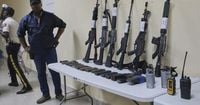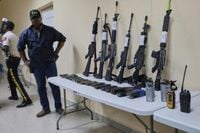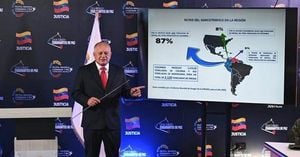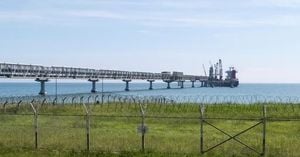In the early hours of August 25, 2025, as most of Port-au-Prince lay shrouded in uneasy sleep, Haitian police launched a daring operation to retake a crucial telecommunications hub in Kenscoff. This site, known as Téléco, had been seized just days earlier by heavily armed gangs—a move that sent shockwaves through the capital and briefly disrupted both air traffic and internet connections across the region. The successful police action marked a rare victory for authorities and their international partners, offering a glimmer of hope in a city where gangs are estimated to control nearly 90% of the territory.
According to the Associated Press, the operation was meticulously planned and executed before dawn, lasting about two hours. Michel-Ange Louis Jeune, spokesperson for Haiti’s National Police, described the raid as a clear signal from the newly appointed police chief, André Jonas Vladimir Paraison. "This is a strong message that the new police chief sent," Jeune said at a news conference, emphasizing the determination of law enforcement to reclaim control from criminal organizations. Jeune, however, refrained from taking questions and did not disclose whether there were casualties during the operation.
Police displayed the fruits of their efforts at headquarters: a cache of firearms, including automatic weapons with their serial numbers meticulously scratched out, and more than 1,000 bullets. The weapons, set out for the media to see, were tangible evidence of the scale and seriousness of the threat facing Haiti’s security forces. "When the population is sleeping, the police are not sleeping. They are working to ensure that people can sleep," Jeune added, underlining the round-the-clock commitment required to confront the country’s security crisis.
The dramatic events leading up to the raid were captured in a series of chilling videos posted online by the gangs themselves. In one, a masked man identifying himself as Didi stood inside the Téléco facility, taunting the government: "You see, this is not a rumor. I am in Téléco. If I don’t receive any calls from you guys, I’m going to get my clan to come burn the whole system now, and there won’t be any communications." Another video showed gang members methodically switching off servers, dismantling equipment, and stacking motherboards outside. "I’m taking everything," one declared, underscoring the sense of impunity with which these groups have operated.
The immediate impact of the takeover was felt across Haiti. Air traffic suffered disruptions, and internet connectivity was briefly impaired. However, as reported by The Independent, Haiti’s civil aviation agency managed to implement contingency measures, ensuring only minor interruptions to essential services. Still, the symbolism of the attack was hard to ignore—it was a brazen challenge to state authority and a reminder of the gangs’ reach.
Responsibility for the assault was quickly attributed to Viv Ansanm, a powerful gang federation that has orchestrated several high-profile attacks on government infrastructure over the past year. The United States, recognizing the group’s destabilizing influence, designated Viv Ansanm as a foreign terror organization earlier in 2025. Their tactics have grown increasingly audacious: early last year, gunmen forced the closure of Haiti’s main international airport for nearly three months and stormed the country’s two largest prisons, releasing approximately 4,000 inmates. Each event has further eroded public confidence in the government’s ability to provide security and maintain order.
The Téléco hub itself is located in Kenscoff, a community that has not been spared from the wave of violence sweeping the capital. Earlier this month, gangs raided a nearby orphanage, kidnapping eight people—including an Irish missionary and a 3-year-old child—who remain missing. These incidents have left residents living in constant fear, with the threat of violence never far from their minds. Gangs have repeatedly targeted Kenscoff in 2025, seeking to expand their influence and tighten their grip on vital infrastructure.
At the news conference following the raid, Godfrey Otunge, the Kenyan commander of the U.N.-backed multinational force in Haiti, made a rare public appearance. His message was succinct but hopeful: "Be patient; you will see results." Otunge’s presence alongside Haitian police officials was a testament to the growing international involvement in Haiti’s security crisis. The multinational force, led by Kenyan police, has faced significant challenges in pushing back against the gangs, but the successful retaking of Téléco suggests that coordinated action may yet yield further gains.
The broader context, however, remains deeply troubling. Experts and analysts have expressed concern over recent developments within the criminal underworld. A particularly notable incident was a video posted on social media, showing Jimmy Chérizier—better known as Barbecue and a leader of Viv Ansanm—engaged in a friendly conversation with Kempes Sanon, once one of his fiercest rivals. Sanon, who leads the Haut Belair/Les Argentins armed group, was previously aligned with G-Pèp, a gang federation that frequently clashed with Chérizier’s G9 coalition. "It was a bit unusual," Diego Da Rin of the International Crisis Group told the Associated Press, noting that it was the first time Sanon had publicly shown his face in this context. Both men are former police officers, and their apparent rapprochement has left observers speculating about the implications for Haiti’s future stability.
For many Haitians, the stakes could hardly be higher. The persistent attacks on infrastructure, kidnappings, and displays of gang power have created a climate of fear and uncertainty. The police operation at Téléco, while successful, is just one battle in a much larger war for the heart of Port-au-Prince. The new police chief, Paraison, seems determined to shift the momentum. His appointment earlier this month was seen as an effort to inject fresh energy and resolve into the fight against organized crime. The promise of further raids in gang-controlled areas, as stated by both Haitian and Kenyan officials, suggests that authorities are not content to rest on their laurels.
Yet, as history has shown, progress in Haiti is often fragile. The gangs’ ability to coordinate, adapt, and even reconcile former enemies poses an ongoing challenge to efforts at restoring order. The international community, led by the United Nations and regional partners, continues to grapple with how best to support Haiti’s beleaguered institutions without exacerbating tensions or undermining local legitimacy.
With the memory of the Téléco raid still fresh, Haitians are watching closely to see whether this rare victory can be translated into lasting change. For families still searching for kidnapped loved ones and for communities living under the shadow of gang rule, the need for security and stability has never felt more urgent.





